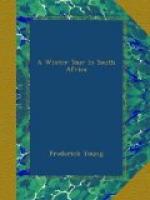insufficient to keep out the cold. It is drawn
by eight horses, and has cramped seats for eight or
ten passengers. On this occasion there were seven
others besides myself. In addition the mail bags
were crammed inconveniently under the seats. In
this post cart I travelled for three days and two nights
by way of Richmond, Heidelburg, Standerton,—where
cattle rearing and horse breeding is successfully
carried on,—and Newcastle, which will be
remembered as having been the base of operations during
the Boer war, and also as the place where the final
treaty of Peace was drawn up and signed by the joint
Commission, to Eland’s Laagte, the present terminus
of the Natal railway, thirteen miles beyond Ladysmith.
At Eland’s Laagte a very promising coal field
is being worked, from which great and important results
are expected in the future. Soon after crossing
the Transvaal border we passed the battle fields of
Laing’s Nek, Majuba Hill, and Ingogo, names
indelibly associated with one of the saddest, as well
as most humiliating, episodes of English modern military
history, in connection with the Transvaal War of 1881.
I gazed mournfully on Majuba Hill, that black spot
of bitter memories to every Briton, and of natural
exultation and pride to the Boers; and on Colley’s
grave, the unfortunate commander, whose unhappy and
most unaccountable military blunder led to the lamentable
and fatal defeat, which cost him his life, and resulted
in the miserable fiasco—the retrocession
of the Transvaal to the Boers. It is impossible
to estimate the damage done to British influence,
prestige, and power by the political consequences resulting
from that disastrous day.
[Illustration: CEMETERY, MAJUBA HILL.]
The south-eastern part of the Transvaal is as bare,
and treeless, and altogether as uninteresting and
unattractive as the south western region, between
Bechuanaland and Klerksdorp, through which I had travelled
a few weeks previously. The instant, however,
the border is crossed, and Natal is entered, the scene
is at once changed, and the beauty of the surrounding
country becomes apparent. Instead of the flat,
wearisome desert of the Transvaal, undulating hills,
clothed with verdure, and an extensive panorama of
broad and fertile plains meets the eye.
[Illustration: Decorative]
[Illustration: GOVERNMENT HOUSE, MARITZBURG.]
[Illustration: Decorative]
MARITZBURG.
After leaving Ladysmith, I proceeded to Maritzburg,
the seat of Government of Natal. This picturesque
town is in a charming situation, the surrounding scenery
being extremely pretty. The town itself, is well
laid out, the streets being wide, and in most cases
edged with trees. Amongst its public buildings
may be mentioned the new House of Assembly, of which
Sir John Akerman is Speaker. It is a handsome
edifice, well arranged, and economically constructed
at a cost of L20,000. A life-size statue of Her
Majesty is to be erected in the front of the building,
the pedestal of which is already in situ.




